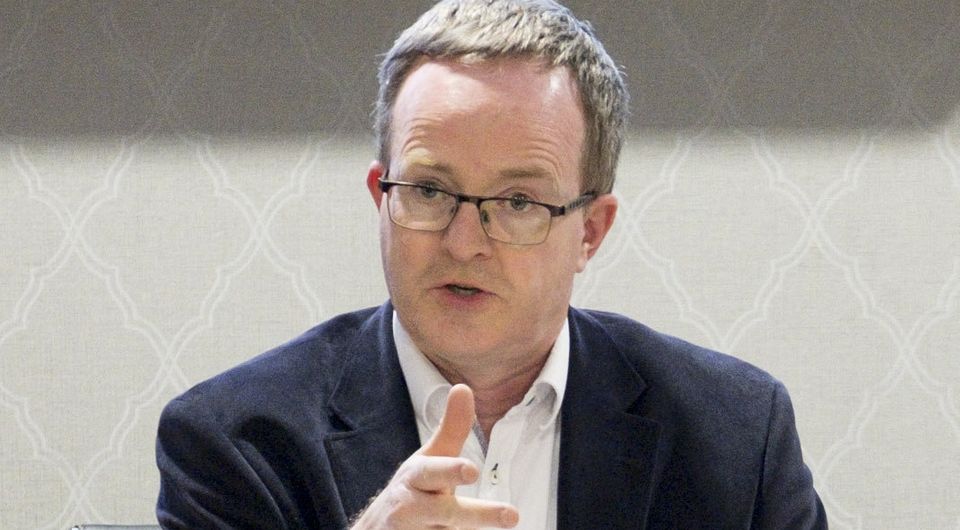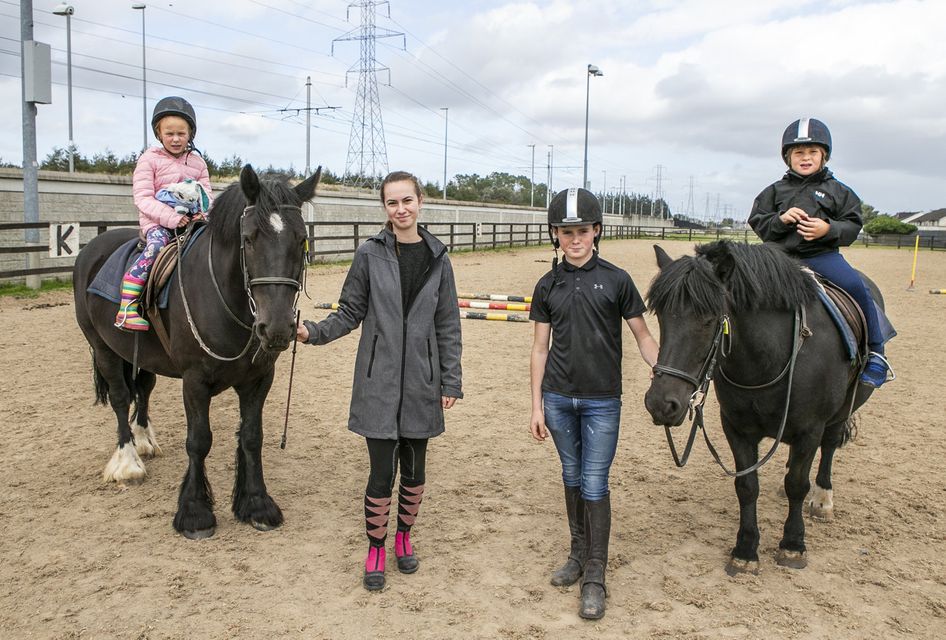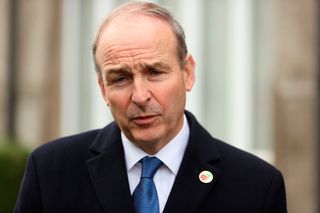Ewan MacKenna: 'Inside the insurance industry that threatens the very existence of local sport'
A general view of Athy Rugby CLub. Photo: www.athyrugbyclub.com
When winter rolls in, it hits Athy harder than most places.
This is a premium article
Premium articles will soon be available only to Independent.ie subscribers.
The locals don't like hearing about it, possibly based of how often they're forced to hear about it, but theirs is a patch that has long since struggled.
Tegral, once the big local employer, never fully recovered after the last collapse; the main street crumbles; houses are being bought up by other councils to dump their problems on a town with enough of its own; and while the last census showed less than 10,000 people there, the last live register had over 1,200 people on it.
It tries. And while it's tough and it's unfair, it's also the reality.
That lot makes the place feel that bit colder, that bit darker, that bit wetter, across the longer months.
On the road in, there sits a large picture of Joey Carbery in the verge. A hero that made it out along that same road.
Peter Boland: Director of the Alliance for Insurance Reform. Photo: Don Moloney
Amidst so many serious and sustained problems are little nuggets though.
At its easterly edge lies the rugby club, and at weekends its pitches are teeming.
It's a success story not solely because of Carbery and his Munster team-mate Jeremy Loughman, but also because of the 150 or so volunteers that plough the hard yards for the betterment of a community that needs them, and that allow for 20 male and female teams from under-six all the way up to adult.
It made a letter posted last December all the more disturbing.
"Unfortunately Athy Rugby Football Club is experiencing grave difficulty in securing Public Liability Insurance due to an historic claim and a currently pending claim against the club..." it read.
"As we may not get any quote, or any financially viable quote, we feel that we must notify members of the possible closure of the club and grounds effective from midnight on Monday, 9 December."
What had actually happened, sources tell us, is that a claim was made after an accident in the bar, that was settled, while another regarding a man playing on their astro-turf pitch remains ongoing.
With that, their insurers refused to give any policy extension to help secure a quote.
Many were surprised.
They shouldn't have been.
It may have been a warning shot but it wasn't the first and it certainly won't be the last.
* * *
Yesterday, the Alliance for Insurance Reform held a meeting with Minister for State at the Department of Finance, Michael D'Arcy.
As much as they welcomed his long overdue chatter of reform in a realm they say now has deeper and more far-reaching problems than its previous crises, they didn't understand his plans and how he aimed to go about this. Nothing was clarified though, and an election means uncertainty for a bit longer when suspense in this area isn't okay.
As head of that alliance Peter Boland puts it: "With smaller insurers leaving market, two areas particularly at risk are anything to do with children and sports organisations.
"There's an inherent risk in sport and the way the Irish personal injury system is set up, the cost of having to deal with claims via the amount of damages and legal fees are enormous.
The Alliance for Insurance Reform held a meeting with Minister for State at the Department of Finance, Michael D'Arcy
"We are becoming beholden to a smaller number of very large insurers and that in itself is causing problems for organisations around the margins.
"The big companies, for them insurance is an annoyance but it won't close them. The damage is being done to the fabric of Irish society via the likes of sporting organisations."
There's a debris field of the wounded and of the casualties already in this sector.
Bike Park Ireland in Tipperary didn't make it through the hikes.
Galway Community Circus which specialises in aerial acrobatics sought cover from 133 different firms but couldn't get adequate insurance.
Triathlon Ireland saw its €56,000 premium in 2018 reach €103,000 this past year and it cost them a development officer they badly needed given the 20,000 members and 90 clubs.
Tug of war saw a 400 per cent hike in its last premium. One amateur junior soccer team that contacted us said, with three adults teams, they were being asked for €8,000 to insure players.
It goes on...
A boxing promoter who ran a show in Newry was covered for £500 but when he went a stone's skim down the road to Dundalk to put on a similar event, the identical coverage was quoted as €5,000.
Such an attitude means Killinarden Community Centre is in trouble having seen a near doubling of its costs in the area since 2017.
Luke Fox (7) and Lucy Coyne (8), both from Saggart, who are taking lessons with their helpers, Thomas Gibbons (14) and Mayla Van Den Berg, in the Fettercairn Youth Horse Project, pictued last September. The club were landed with an insurance premium of €42,000, up from only €5,500. Photo: Kyran O'Brien
Meanwhile, Fettercairn Youth Horse Project - a horse riding facility for disadvantaged children in Tallaght - is in the midst of forced cutbacks after they were landed with a premium of €42,000, up from only €5,500.
And on...
In Blarney, golf club members are today waiting to see what happens to their passion after the hotel leisure centre closed due this insurance scandal.
In Cork city the council there also cited it as the reason behind the locks being chained on the gates of a purpose-built BMX bike park.
And on...
A slow bleed.
"More and more sports are looking at this and asking what events do we've to cut now," says Mary O'Connor, head of the Irish Federation of Sport which is an umbrella group for sporting bodies on the island.
"A lot of reports are out over physical activity and the lack of it, and we've a national physical activity plan and a national sports policy plan to increase the numbers of people who get active.
"We've a government too that have invested in sports capital in the last few years but if you want people to use those facilities, insurance shouldn't be prohibitive."
Back in May, with it rapidly skipping the queue of their members' concerns, the federation joined the Alliance for Insurance Reform while conducting a poll.
It showed that 97 per cent of those members had their premium increase since 2014, with the average being 45 per cent.
In total, nine per cent of budgets were accounted for by said premiums, and in four instances that percentage was between 20 and 30. Another 27 per cent said that not only had their insurers jacked up the price, but in doing so they increased excesses and threw in a list of new exclusions.
"We've more money going to sporting bodies and more for facilities," continues O'Connor.
"Yet the facilities won't be used and people can't play sport in them. It leaves a couple of options as either sports cut back or insurance increases are passed to ordinary people, which goes against the grain of community sport where people should be able to participate at a reasonable cost."
Within that is a key point that should sicken stomachs, for consider what's been happening.
Taxpayers are handing over their wages and sport is rightly getting a slightly better cut of this and all seems well on the surface. But dig a little.
What's really happening is those grant and funding increases are making their way to the insurance industry and a group of laughing stakeholders. In other words you are paying for big business to grow profits on top of profits with sport being the hijacked vehicle.
It's a plague on all your houses.
Down that rabbit-hole we go.
* * *
While Athy Rugby Club was struggling, another club demonstrated why it was struggling.
The new secretary of that club asked that it not be named, but also told of the previous regime. Two seasons ago, they couldn't so much as insure the players on their adult team due to a claims culture in that club.
There was a raft of pulled muscles being a reason to cash in. One player even hurt his back playing golf, openly admitted this was how it happened, but officially said it was done in a match in this sport. Lawyers were called. Insurers paid out.
Ultimately, sport footed the bill for this to go on.
In Ireland it's decimating clubs that are trying to do their best as an invaluable outlet.
As one person who worked in the Irish insurance market before, and who now is in the same business in the City of London, tells us: "Ireland is in the top three uninsurable places in the world. Number one being US and particularly California where there's a claims culture of ambulance chasing; then Australia with fund litigation; and then Ireland."
They go on to explain it in the most basic terms as this is how their industry sees the model working.
For a €100 premium, €40 of that will go to costs from wages to rent, €50 should go to claims, with that final €10 being profit. The problem is that in Ireland claims started at €50, then went to €100, then to €150.
"So you hike the premium. If that doesn't work and people won't pay that premium, insurance companies pull out," they add.
"That means you are taking capacity from that market, and those left know that around sports liability, people are obliged to buy it but suddenly the imbalance in supply and demand means they just up the prices to increase profit."
This person adds that today, only eight insurers have 91 per cent of the liability market in the Republic. They also say that while insurers have to take some of the blame, it goes far beyond them.
For instance they and the legal element in this have spent their time pointing at one another and creating a smokescreen that they both make a fortune behind.
Indeed last year alone, lawyers' fees in this area came in at €350m.
As an Irish barrister tells us: "It would seriously tempt you to start a personal injury firm. The costs in Ireland are outrageous. It's a complete scandal".
Others in the legal profession revealed the 'how' behind that 'what' from their end and, while not directly related to sport, they do show up the disease that's causing so many serious symptoms.
One spoke of the aftermath of a car accident. Two kids were in the back and when the mother told a solicitor they were fine, the law firm replied: "Funny you say that, a lot of kids don't have physical effects but they do have psychological effects. Were they upset after?"
With that the children were whisked off to a friendly psychologist who gave the findings they wanted and suggested they were having nightmares and a struggle to get back in a vehicle.
"We all know right from wrong and it was glaring," says a person involved. "But speak up and be sacked."
Another points to an array of what they refer to as "tame doctors" who are more than willing to do "favourable copy-and-paste jobs for a steady stream of well-paying referrals."
One lawyer tells us of a firm they worked for that had a dozen of the same family coming through a revolving door and making multiple claims each, but notes the firm were happy to take their business as public liability means they are making a fortune out of each and every victory.
Another spoke of a case that traversed jurisdictions and involved both a UK and an Irish legal company.
A lawyer here sent a €15,000 bill but was warned by their counterparts across the water that they were wasting their time as it doesn't work like that in England.
"We told them they'd likely have to go to the cost board, there they might get €4,000, and then they'd be charged three-quarters of that for taking up the board's time. Their presumption told a telling tale.
"We all already know ambulance chasing firms, everyone knows who they are. So some solicitors are driving this as well as insurance companies.
"People didn't work out how to get these claims without solicitors pushing for them. Insurance companies are profiteering but it doesn't mean some of us don't have a snout in trough as well. Most are good so it's a small minority. But still..."
That's enough to do so much damage. Ask around and you'll quickly hear the extent of it.
* * *
A statistic to shock and scare.
A minor soft tissue injury in the industry is referred to as a whiplash injury. In the United Kingdom the average payout over these is €3,798. In Canada it's just over €2,000. In Germany it's barely over €1,000. In Sweden there's actually no financial compensation when this occurs.
In Ireland however, the average for exactly the same claim stands at €17,338.
It's one of the few facts we have about public liability for while the national claims database helped show the truth about what's happening in motoring, the liability sibling isn't expected for at least another year, and that's before the usual and expected insurance industry stalling.
In the meantime the Alliance for Insurance Reform tell us of three major problems. There's that scale of damage for minor injuries.
There's the level of fraudulent claims they say isn't nearly as high as insurers are suggesting, but that is enough to drive up costs nonetheless and creates a cover for the real problem.
And then there's the duty of care, with some judges' awards and some insurers' out-of court settlements meaning there's almost an absolute duty on clubs when that should never ever be the case.
"All this means from your perspective that sporting clubs and organisations here are being forced borrow money, to dig into reserves, or cut back," stresses Boland.
"We've seen them all. That can only go on for so long. There's a serious issue with multinational insurers having their way with the Irish market but equally there's a serious issue with the number of prolific solicitors and their clients who have driven the fraudulent and exaggerated side to an enormous extent.
"For the insurers, it's not a bother to them if there's a claims culture here as they just pass on the cost to people and we've now reached a situation where those policy holders can't afford it.
Irish sports clubs have struggled with rising insurance costs. (stock photo)
"There's a contrast we are asked about constantly too, where we've this profit the insurers are making and yet you've got an exodus of operators from the country.
"One of the issues, sport was typically insured by specialised insurers whether brokers or underwriters. They're disappearing. And for those still there, it's easier to make money out of large corporate customers than hundreds of small independently operated clubs.
"There's an inherent risk in sport due to the way the Irish personal injury system is, and the cost of having to deal with claims via amount of damages awarded or legal fees. So the appetite isn't there to take them on."
In that sense, he means that while more and more cannot afford their premiums, on this trajectory it won't be long before the premiums aren't even there to not be affordable.
As an insurance industry insider tells us there's no easy solution and there isn't the will to solve it anyway. As an example they say that one aspect is to make certain lawyers less greedy which isn't going to happen, the other is to modernise the judiciary which will take an absolute age.
Where does that leave clubs?
"Elsewhere they would have a national organisation," they say.
"A sporting body sets up a policy to cater for all its members and basically they act as the insurance company. To protect liability they'd re-insure that out.
"What we see in other places, once you've this closed set of people, the moral hazards become lower. You've a group that care about their sport and are less likely to go after that sport, so it keeps lawyers away and drives down the premiums.
"Without that, it's going to get so bad you'll sign a disclaimer before you play a game in any sport in Ireland and that'd be challenged and likely lost in the courts. This is quickly coming to a head."
* * *
Back in Athy Rugby Club, as it turns out they got lucky.
With help from the Leinster Branch, the IRFU and those in the political sphere, they lived to fight one more year.
Granted, lucky in this space doesn't actually mean anything particularly good. Instead it's a moratorium on some of the bad.
While they finally managed to get insured for 2020, a source showed us what their new policy looks like and the restrictions suddenly imposed.
It means that the revenue from their astro pitches where the pending case began is gone. Money from their bar and from hosting events in it has also been slashed away.
They say they'll lose around €40,000 per annum in revenue as a result and they could do with that income given that their premium has suddenly doubled despite the slew of new demands.
"Even if we had that income, the cost of that premium going forward is almost impossible," says a member of their board. In fact by now, they've been forced into a GoFundMe campaign to raise €10,000.
As of Thursday it stands at €905 meaning once more the clock is counting down.
Should they get to their target mark, some of that generosity will make its way to the insurance industry and their margins. Some more of that will make its way to the legal profession. None though will make its way to those they serve in a place that badly needs their service.
The winter has nearly passed in a part of the world that feels it harder than most.
But it always comes back around again.

















